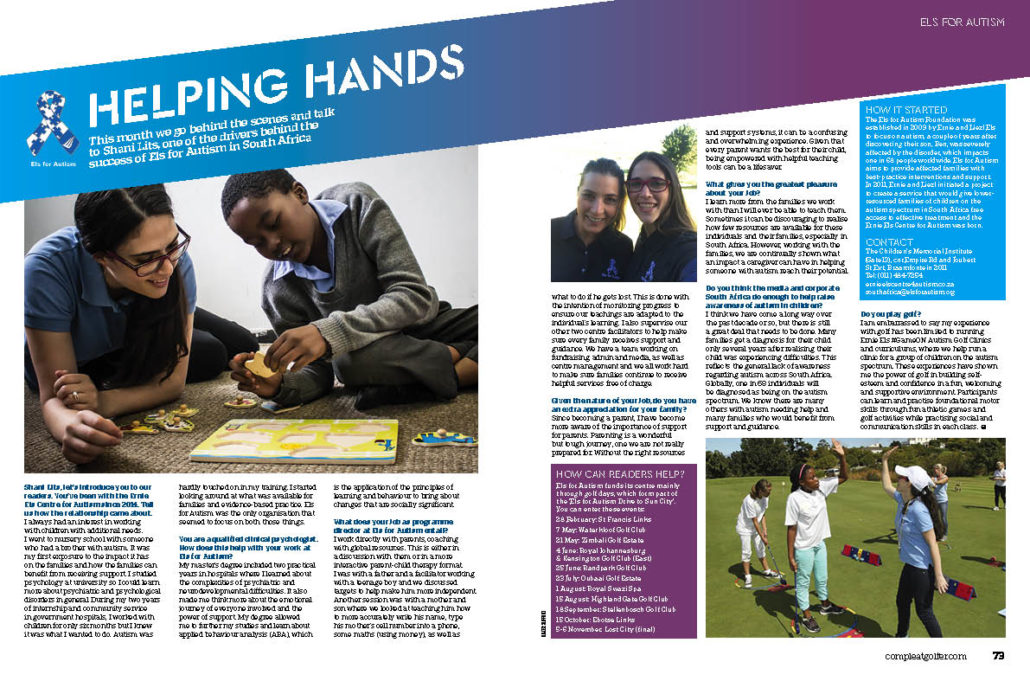This month we go behind the scenes and talk to Shani Lits, one of the drivers behind the success of Els for Autism in South Africa.
Shani Lits, let’s introduce you to our readers. You’ve been with the Ernie Els Centre for Autism since 2014. Tell us how the relationship came about.
I always had an interest in working with children with additional needs. I went to nursery school with someone who had a brother with autism. It was my first exposure to the impact it has on the families and how the families can benefit from receiving support. I studied psychology at university so I could learn more about psychiatric and psychological disorders in general. During my two years of internship and community service in government hospitals, I worked with children for only six months but I knew it was what I wanted to do. Autism was hardly touched on in my training. I started looking around at what was available for families and evidence-based practice. Els for Autism was the only organisation that seemed to focus on both those things.
You are a qualified clinical psychologist. How does this help with your work at Els for Autism?
My master’s degree included two practical years in hospitals where I learned about the complexities of psychiatric and neurodevelopmental difficulties. It also made me think more about the emotional journey of everyone involved and the power of support. My degree allowed me to further my studies and learn about applied behaviour analysis (ABA), which
is the application of the principles of learning and behaviour to bring about changes that are socially significant.
What does your job as programme director at Els for Autism entail?
I work directly with parents, coaching with global resources. This is either in a discussion with them or in a more interactive parent-child therapy format. I was with a father and a facilitator working with a teenage boy and we discussed targets to help make him more independent. Another session was with a mother and son where we looked at teaching him how to more accurately write his name, type his mother’s cell number into a phone, some maths (using money), as well as what to do if he gets lost. This is done with the intention of monitoring progress to ensure our teachings are adapted to the individual’s learning. I also supervise our other two centre facilitators to help make sure every family receives support and guidance. We have a team working on fundraising, admin and media, as well as centre management and we all work hard to make sure families continue to receive helpful services free of charge.
Given the nature of your job, do you have an extra appreciation for your family?
Since becoming a parent, I have become more aware of the importance of support for parents. Parenting is a wonderful but tough journey, one we are not really prepared for. Without the right resources and support systems, it can be a confusing and overwhelming experience. Given that every parent wants the best for their child, being empowered with helpful teaching tools can be a lifesaver.
What gives you the greatest pleasure about your job?
I learn more from the families we work with than I will ever be able to teach them. Sometimes it can be discouraging to realise how few resources are available for these individuals and their families, especially in South Africa. However, working with the families, we are continually shown what an impact a caregiver can have in helping someone with autism reach their potential.
Do you think the media and corporate South Africa do enough to help raise awareness of autism in children?
I think we have come a long way over the past decade or so, but there is still a great deal that needs to be done. Many families get a diagnosis for their child only several years after realising their child was experiencing difficulties. This reflects the general lack of awareness regarding autism across South Africa. Globally, one in 68 individuals will be diagnosed as being on the autism spectrum. We know there are many others with autism needing help and many families who would benefit from support and guidance.
Do you play golf?
I am embarrassed to say my experience with golf has been limited to running Ernie Els #GameON Autism Golf Clinics and curriculums, where we help run a clinic for a group of children on the autism spectrum. These experiences have shown me the power of golf in building self-esteem and confidence in a fun, welcoming and supportive environment. Participants can learn and practise foundational motor skills through fun athletic games and golf activities while practising social and communication skills in each class.








